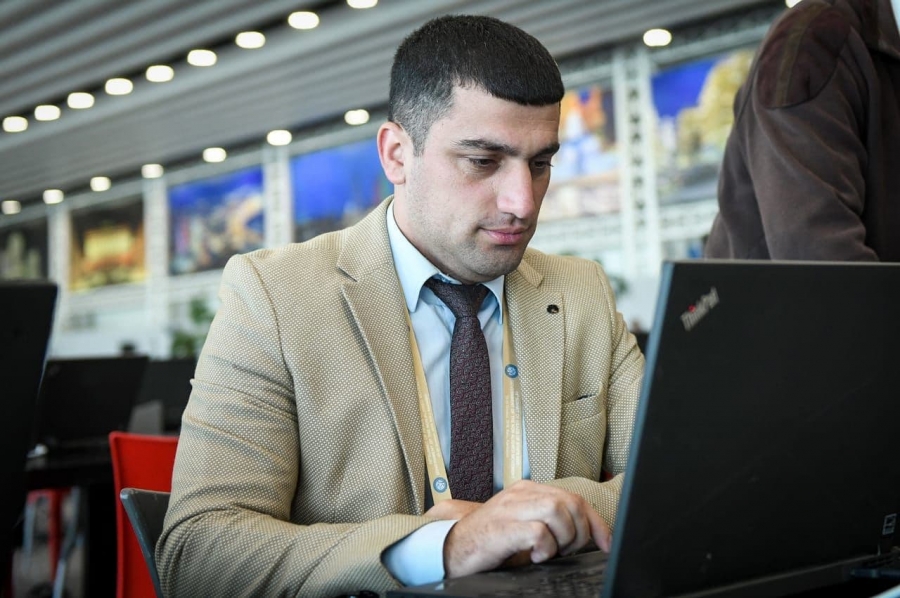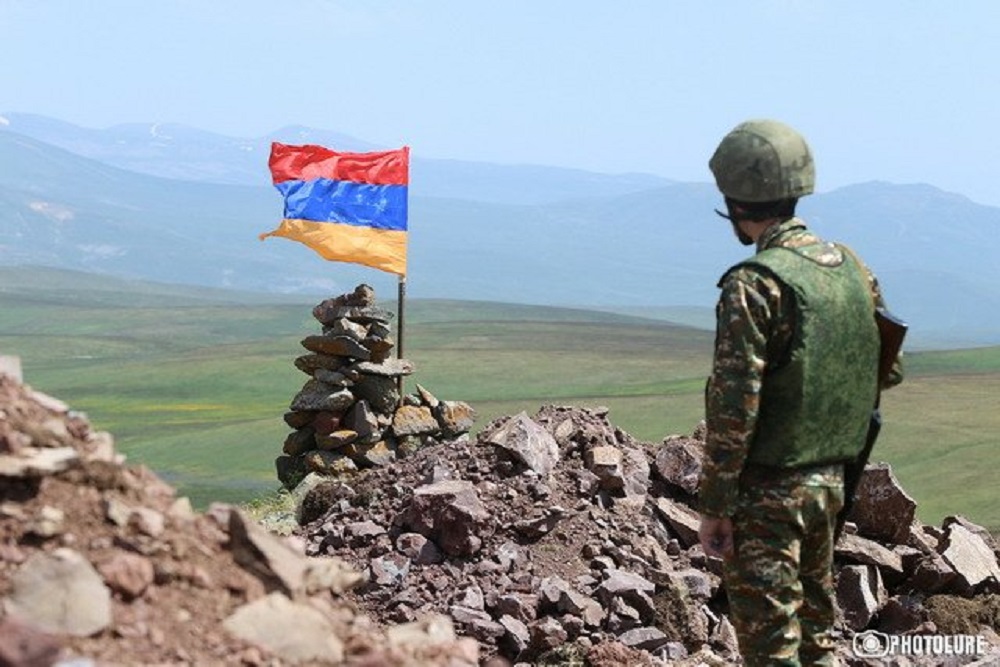Сommentary from Baku: What are the causes of tensions at the Armenian-Azerbaijani border?
In recent days, tensions have escalated at the Armenian-Azerbaijani border. The parties accuse each other of violating the ceasefire; as a result of the shootings, several servicemen have been killed and wounded. What are the reasons for the ongoing tensions and why do both parties violate the existing ceasefire?
Azerbaijani political observer Agshin Kerimov answers these questions and more.
- Several wounded, killed in recent Armenian-Azerbaijani border clash
- Aliyev on Armenian-Azerbaijan border, Nagorno-Karabakh status: We are in our territory
“Azerbaijan is taking preventive measures”

According to the political observer, after the victory in the second Karabakh war, Azerbaijan introduced a new priority on the military agenda and a new military strategy in the post-conflict period is important for ensuring the final (and decisive) peace:
“The matter concerns the beginning of the process of delimitation and demarcation on the strip forming the state border between Azerbaijan and Armenia in the Karabakh zone. Why is it important?
First, Azerbaijan, along with strengthening border security, is taking preventive measures against possible risks from Armenia.
Secondly, the definition of the state border strengthens the position of Azerbaijan in the implementation of the Zangezur corridor project and ensures the strategic superiority of Azerbaijan.
In the course of these processes, elements that reflect global rivalry also manifest themselves. Some time ago, Azerbaijan made a step towards the West with its statement on the Iskander-M missiles. In those days, Azerbaijan pursued a pro-Western policy in order to reduce the strength of Russian pressure but at the same time declared the strategic importance of ties with Moscow. With the exception of France, the post-conflict period from the point of view of the attitude of the West at first was adequate, which could not but arouse frustrations in Moscow”.
“Erdogan arrived in Shusha immediately after the NATO summit”
“Interest from the West increases the likelihood of NATO’s participation in the region, albeit indirectly. The Shusha Declaration, signed by the leaders of Azerbaijan and Turkey, is also important from the point of view of theWestern interests in the region”, Agshin Kerimov explains.
“If you have noticed, Turkish President Recep Tayyip Erdogan arrived in Shusha immediately after the NATO summit, which means that some details of the declaration have been agreed with the West. But Baku and Ankara also took into account Moscow’s interests in the document, and for this reason, the declaration reflected the activities of the joint Russian-Turkish monitoring center”, Kerimov says.
“Let’s look at the processes that took place after. The West shows warm feelings, but cold winds blew from the northern neighbor, “the political observer emphasizes, and recalls that on the eve of the signing of the Shusha Declaration, the West provided the transfer of minefield maps to Azerbaijan in the Aghdam region,” and this indirectly meant limiting Russian initiatives. “
“The West and Moscow are taking their rivalry into the region”
Kerimov says that after a while Moscow with a similar initiative “neutralized the West”, as with the mediation of the Kremlin, the maps of minefields in the Fizuli and Zangilan regions were transferred to Azerbaijan:
“After this event, the West made adjustments to its rhetoric and again made statements about the status, while Moscow pointed to the Armenian Armed Forces after the shootout in the direction of the city of Shusha in Karabakh. In other words, the West and Moscow are stepping up their rivalry on a new plane and both sides are using their leverage over Baku.
And what did Baku do in response? Following the mention of “status” by the President of the Council of the European Union Charles Michel in Yerevan, it reminded Moscow of its tasks emanating from the statements signed on November 10, 2020, and January 11, 2021, and achieved a change in the rules of the game. After that, Moscow began to demonstrate a more constructive position”.
“Border demarcation is key to the opening of Zangezur corridor”
“Clashes on the border take place amid the great interests of two big forces in the new geography of the region but neither the West nor Moscow are opposed to the border demarcation. In turn, both international forces are trying to be in this issue not as parties with equal rights but with full ‘monopoly’ over the process.
The economic benefits of the opening of the Zangezur corridor, which will occur after the borders have been determined, are in the interests of the West, Russia and Iran. But it is hard to say how exactly it will be carried out. It should be borne in mind that Azerbaijan is not the only player in this issue and another concern of the West is associated with the Ankara factor. Because, in parallel with the corridor, the opportunities for Ankara’s military participation in the new geography are increasing. Therefore, Moscow is trying to coordinate its interests with Ankara and Baku, which irritates the West.
This is an indicator of the collision of economic interests of political poles in the delimitation and demarcation of borders. Determining the boundaries is key to the opening of Zangezur corridor, and this corridor brings global rivalry to a new plane. China is also interested in the opening of the aforementioned corridor, and the United States, as well as Russia, want to stop it”, Kerimov added.
Did Kremlin provide cartographic data?
As for the cartographic data, Kerimov noted that the Kremlin is ready to provide such data.
But did Moscow provide the maps? It is difficult to answer this question, but many believe that it did.
“Following a meeting with his Russian counterpart Vladimir Putin, President Ilham Aliyev said the other day that there were no controversial issues between Baku and Moscow. As I have already noted, this was the result of a change in the rules of the game on the part of Baku. Apparently, Baku introduced a strategic meaning to the messages sent to Moscow on the eve of that meeting. Reinsurance in the global confrontation became a benefit for Baku, and so far, during this period, the processes are not going against the will of Azerbaijan.
At the same time, Ilham Aliyev warned Armenia about the importance of opening the Zangezur corridor, and this also attracts attention after the meeting in Moscow. Because. According to him, there are no controversial issues with Moscow.
This is also another reminder of Russia to Armenia because after the electionsб Nikol Pashinyan once again demonstrated an example of simultaneous curtsies in both directions, thereby upsetting the balance. The expansion of the platform of global rivalry, which I have already mentioned, has manifested itself in relation to Armenia. The European Union has allocated 2.6 billion euros to this country, and this amount suggests that the West is doing its best to tear Yerevan away from Moscow.
Therefore, an angry Russia again makes a “stake” on Baku and supports Azerbaijan in the issue of borders.
As a result, I can note that Baku takes into account the interests of the great powers but is also taking steps to block the transition of these interests into large-scale ambitions”.
Is Russia benefiting from the ongoing tensions?
Regarding the degree of Russia’s interest in the growth of tensions on the border of Azerbaijan with Armenia, Agshin Kerimov thinks that the northern neighbor is always interested in this “because it creates the basis for interventions. At the same time, Russia is a seller of weapons to both Azerbaijan and Armenia, and the proceeds from the sale of weapons play an important role for Moscow”.
“But Moscow is in no way interested in large-scale provocations. This would have hit its already not very high political authority. Currently, Russia is interested in new economic platforms in order to slightly reduce the consequences of the socio-economic crisis at home. Therefore, the prospective volume of trade turnover with Ankara is estimated at around $100 billion. And from the point of view of achieving this goal, the Zangezur corridor could become a convenient trade route”, Agshin Kerimov notes.
Will tensions continue at the border?
According to the political observer, the aggravation will continue, but it is unrealistic to expect it to become large-scale and transform into a new war:
“And the most remarkable thing in this is that these processes are taking place amid the declaration of Zangezur, Goych, and Yerevan as historical Azerbaijani territories, which means that Baku, in relation to these territories, is voicing the basis for asserting justice.
Where will the point be made? The point will be made with the signing of a peace treaty, it is for this reason that Baku spends its resources against Armenia to achieve a strong position in these negotiations, and statements causing hysteria in the Armenian society, and demonstrating strength on the battlefield”.



















